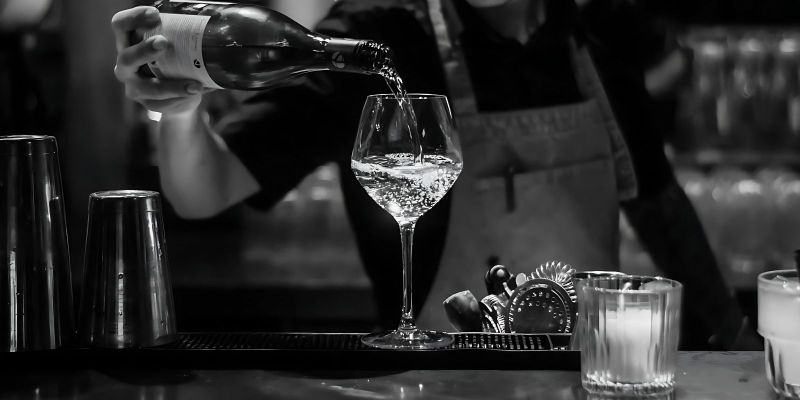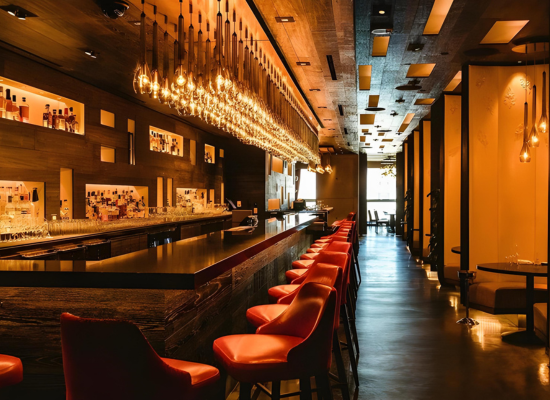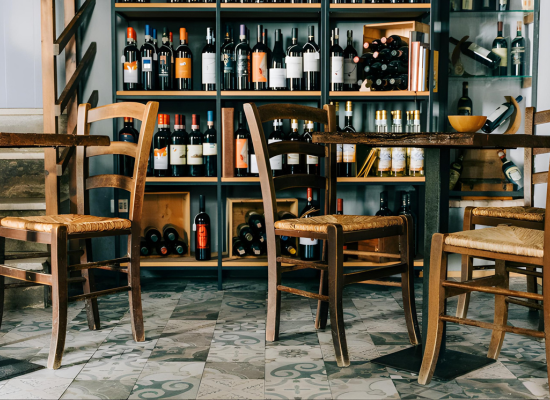Educating Sommeliers Worldwide.
By Beverage Trade Network

Reports in both the business press and popular media make clear that an updated version of the wine bar concept is experiencing sustained growth at the present moment. This trend provides intriguing and useful insights into marketing, generational consumer traits, and overall business planning that is useful not only for potential wine bar entrepreneurs, but also for restaurateurs, sommeliers, and F&B managers.
CGA just reported that in the US, more than a quarter (27%) of consumers expect to visit bars, restaurants, and similar venues more often this summer. For Zilennials, among those aged 21 to 34, “the number who expect to increase their visits is even higher at 45%.” Both traffic (+5%) and check value (+3%) are trending higher. Nine in ten (89%) consumers have been out to eat in the on-premise Sphere in the last month, and, significantly for wine bars, nearly half (45%) have gone out just for a drink.
Reports in Punch, the New York Times, the San Francisco Chronicle, and New York magazine document a boom in independent wine bar business, and their character is changing. I also talked to two experts (Alder Yarrow and Karen MacNeil) for advice on essential elements of a wine bar experience to create a sustainable business model. Notably, restaurant owners may want to consider adding a wine bar space to expand market share and draw new customers, particularly from the younger generations.
US wine bars have evolved into sophisticated establishments that cater to a growing audience of wine enthusiasts, with a focus on Zillenials. This transformation is driven by the natural wine movement, the integration of high-quality food offerings, and the creation of unique atmospheres, or what Punch calls the “cool, new modern wine bar” concept. For aspiring wine bar owners, understanding the current business model and crafting a comprehensive business plan is essential. Sommeliers, too, need to stay informed about these developments to remain relevant and competitive.

Source: Unsplash
Modern wine bars, particularly in New York and California’s Bay Area, combine a relaxed ambiance with sophisticated wine and food offerings. Many increasingly differ from traditional wine bars by integrating high-quality food, often rivaling full-service restaurants. Establishments like New York’s Estela, the Four Horsemen, and Wildair have pioneered this model, offering curated menus alongside extensive wine lists.
A clear recent innovation is combining bar service and retail sales. The Chronicle’s Esther Mobeley wrote last year: “The wine bar can feel like a nebulous concept: not quite a bar, not quite a restaurant. These days, the genre’s lines are blurring even more, as nearly every new wine bar doubles as a bottle shop.” Any business plan entailing both service and retail must be carefully executed. Alder Yarrow told us: “I’ve seen a proliferation of the retailer/wine bar combo shop, which is not my favorite place or way to drink wine.” Yarrow continued: “Often these places will offer only 4 - 6 wines by the glass. The better ones have a nice policy of letting you open a retail bottle for a small nominal fee, making it quite convenient to drink with friends. Most such venues don’t have a nice atmosphere, being more wine shops than wine bars.”

Source: Unsplash
The experts agree that serving food is not a critical requirement of the business plan. Most important is that “going out and drinking is supposed to be fun,” according to an article in Punch. Rachel Sugar writes: “What we want is to hang out. We want to do it casually, glamorously, and in public. We want to do it at the cool new modern wine bar, a category as bafflingly flexible as it is unmistakably distinct.”
These wine bars are designed to be urban treasures, akin to the diminutive bars à vin of Paris. As seen in places like Penny on E. 10th Street, New York, wine bars have become vibrant social hubs where the atmosphere is casual yet refined.
The natural wine boom has significantly influenced the wine bar scene. Patrons are increasingly interested in natural, biodynamic, and organic wines. In an interview, wine expert Alder Yarrow pinpointed “the major trend of the last 20 years'' as “the explosion of natural wine bars.”
He is undoubtedly correct. New York magazine refers to the “supercharged” wine bar trend stemming from the “natural wine” phenomenon, “keeping pace with the natural-wine boom.” Eric Asimov in the New York Times wrote in late 2022 that “the best new wine bars focus on selections especially popular with younger wine drinkers: natural wines, skin-contact or orange wines, pétillant naturels, and the like. You won’t find a lot of places with classic Napa Valley cabernets or Bordeaux.”
Penny’s wine list, overseen by Chase Sinzer and Ellis Srubas-Giammanco, reflects this trend, offering around 50 bottles of Champagne and other unique selections like Domaine de Sulauze’s "Super Modeste" from Provence.
For wine bars that decide to offer food service, high-quality cuisine is a defining feature. Menus are crafted to complement the wine offerings, focusing on fresh, seasonal ingredients and innovative dishes. For example, Penny’s menu includes meticulously prepared seafood dishes such as octopus on whipped potatoes and an oyster pan roast. This focus on culinary excellence elevates the overall wine bar experience.

Source: Unsplash
Successful wine bars create a sense of community. They are not just places to drink wine but social hubs where people gather to relax and enjoy good company. Demo, named after nearby Father Demo Square, enhances its appeal with a vibrant atmosphere and communal seating, fostering a lively and welcoming vibe. Mobley concludes: “Whereas a few years ago it would have been impossible to imagine the Bay Area’s buttoned-up wine bars getting rowdy, now many have become late-night party destinations.”
Thorough market research is crucial. Understand the local demographic, identify competitors, and analyze market trends. Recognize the preferences and behaviors of potential customers, focusing on what attracts them to wine bars. For example, New York magazine highlighted the importance of understanding the influence of European wine bar traditions on local preferences. In addition, the hot target market clearly consists of Millennials and members of Gen Z in the US and the UK. This is critical to keep in mind.
Define what sets your wine bar apart. Is it the unique wine selection, the quality of the food, the ambiance, or a combination of these elements? Today, according to Asiimov’s analysis, “what sets apart the best of the newer wine bars and the most enduring of the standbys is both their individuality and the intelligence of the wine lists.” This USP will resonate with the young target market and differentiate a wine bar from competitors. The distinctive atmosphere and curated wine lists of places like Claud and Penny exemplify strong USPs.
The current USP should not be about wine education. Eric Asimov observed that wine bars with an “educational pose” are definitely out of favor. Industry expert Karen MacNeil loves wine bars but advised in an interview: “Don’t recite the tech sheet to me and don’t pretend that you’re taking a WSET exam by hammering on with your deductive analysis.”
Choose a strategic location that attracts foot traffic and aligns with your target demographic. Neighborhoods with a vibrant dining scene or areas undergoing revitalization often provide fertile ground for new wine bars. The successful placement of Penny on E. 10th Street, with its second-floor space providing unique benefits, underscores the importance of location. Asimov advises: “Good wine bars are informal neighborhood gathering places rather than destinations.”
Curate a diverse wine list that includes natural, biodynamic, and organic wines, alongside traditional selections. Partner with knowledgeable sommeliers to ensure a balanced and appealing wine menu. The food menu should complement the wines, focusing on high-quality, seasonal ingredients. Penny’s raw-bar assortments and unique dishes like the $49 beggar’s purse of crème fraîche and caviar illustrate the importance of a well-thought-out menu.
Invest in creating a welcoming and stylish environment. The design should reflect the concept of your wine bar, whether it’s a cozy, rustic vibe or a sleek, modern aesthetic. Comfortable seating, appropriate lighting, and thoughtful décor contribute to the overall experience. Demo’s L-shaped dining room and communal seating area highlight the role of design in creating a vibrant atmosphere. Sugar writes “Unlike the standard-issue restaurant, where you sit once you are seated, the cool new modern wine bar is designed to foster movement, or at least suggest that movement is possible.”
Hire passionate and knowledgeable staff, including experienced sommeliers and chefs. Training is essential to ensure excellent customer service and to educate staff about the wine offerings. The role of a bearded Frenchman at Demo, who explains menu items and offers wine suggestions, exemplifies the importance of well-trained staff.
Develop a robust marketing strategy, with social media as a centerpiece. Utilize social media, local advertising, and partnerships with wine distributors and local businesses. Host events like wine tastings, pairing dinners, and meet-the-winemaker nights to attract and engage customers. Highlighting unique offerings, such as Penny’s “ice box” raw-bar assortments, can also draw attention and create buzz.
Create a detailed financial plan that includes start-up costs, operating expenses, and projected revenue. Consider factors such as lease agreements, licensing, inventory costs, and staffing. A solid financial plan will help secure funding and guide the business towards profitability.
Sommeliers must stay updated on this wine bar trend, particularly the growing interest in natural and biodynamic wines. Understanding these trends and being able to educate customers about them is crucial. The emphasis on unique wines at Penny and Demo highlights the importance of staying informed.
A sommelier’s role in a wine bar extends beyond selecting wines. They must also create pairings that enhance both the wine and the food. Knowledge of food flavors, textures, and preparation methods is essential to create harmonious pairings. From the above review, the innovative dishes at Penny and the careful attention to pairing at Demo exemplify this approach.
Modern wine bar patrons are often curious and eager to learn. Sommeliers should be prepared to educate customers, sharing knowledge about wine regions, production methods, and tasting notes. This enhances the customer experience and builds loyalty, as Karen MacNeil told us. Sommeliers at Demo and Penny who take the time to explain menu items and wine selections provide excellent examples.
Developing relationships with wine producers and distributors is important. These connections can provide access to exclusive wines and valuable insights into emerging trends. Sommeliers should also foster relationships with regular customers, learning their preferences and providing personalized recommendations. Karen MacNeil told us that storytelling remains critical. “Tell me a story about the people who made the wine and the place where they made it. Like lots of wine drinkers, I’ll probably fall in love with the story.”
Sommeliers contribute to the overall atmosphere of the wine bar. They should be approachable, friendly, and passionate about wine. Creating a welcoming environment encourages repeat visits and word-of-mouth referrals.
In conclusion, the wine bar business model has evolved significantly, blending casual dining with sophisticated wine offerings. Aspiring wine bar owners must understand the key elements of this model and create comprehensive business plans that address market research, unique selling propositions, location, menus, design, staffing, marketing, and financial planning. Sommeliers, meanwhile, play a crucial role in the success of wine bars by staying informed about trends, curating wine selections, educating customers, building relationships, and creating a welcoming atmosphere. By embracing these strategies, both wine bar owners and sommeliers can thrive in the vibrant and competitive landscape of New York’s wine scene.
Header Image Source: Unsplash